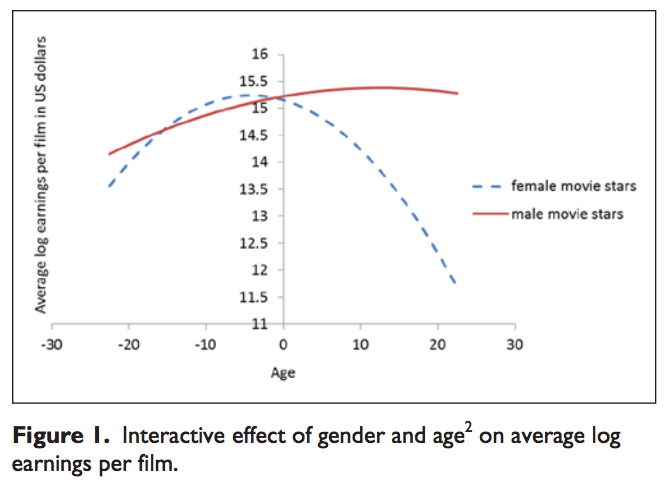Hollywood Overvalues Older Male Actors And Undervalues Older Women
A female movie star’s salary peaks at age 34, and then drops off the cliff. Men hit their peak earnings at 51, and keep on making money
/https://tf-cmsv2-smithsonianmag-media.s3.amazonaws.com/filer/95/b8/95b86adb-f178-41c7-aba9-ff46812fd8d6/box_office.jpg)
When is an actor over the hill? Turns out that depends on whether they’re a man or a woman. According to a recent study, the average earnings of a female movie star increases until age 34, and then drops off a cliff. Men, on the other hand, hit their peak earnings at 51 and keep on making good money until they retire.
The study took a look at 168 men and 97 women in Hollywood with at least one leading role in a movie between 1968 and 2008. They then sourced the salaries of those actors and actresses and tried to control for how big a role they had in each film, their experience and the number of awards they’d been nominated for or won. The key graph is this one:

The red line shows men's average earnings and the blue women's. Not only does women’s take drop precipitously after 34, the study authors even had trouble finding women over 45 to include in the study.
The fact that Hollywood has completely different attitudes towards aging for men and women probably won’t surprise you. Take this analysis of movie posters: aged, wrinkled men are rugged and alluring. Wrinkled women are airbrushed. Susan Sontag once wrote:
The great advantage men have is that our culture allows two standards of male beauty: the boy and the man. The beauty of a boy resembles the beauty of a girl. In both sexes it is a fragile kind of beauty and flourishes naturally only in the early part of the life-cycle. Happily, men are able to accept themselves under another standard of good looks — heavier, rougher, more thickly built…
There is no equivalent of this second standard for women. The single standard of beauty for women dictates that they must go on having clear skin. Every wrinkle, every line, every gray hair, is a defeat.
The authors of the study propose a few different reasons why this clear difference in salaries would exist. One is that there are fewer roles available for women over 45. Another is that men negotiate for higher salaries than women do. A third is that studios value men’s work over women’s, especially as they age. All three are probably part of the problem.
/https://tf-cmsv2-smithsonianmag-media.s3.amazonaws.com/accounts/headshot/Rose-Eveleth-240.jpg)
/https://tf-cmsv2-smithsonianmag-media.s3.amazonaws.com/accounts/headshot/Rose-Eveleth-240.jpg)